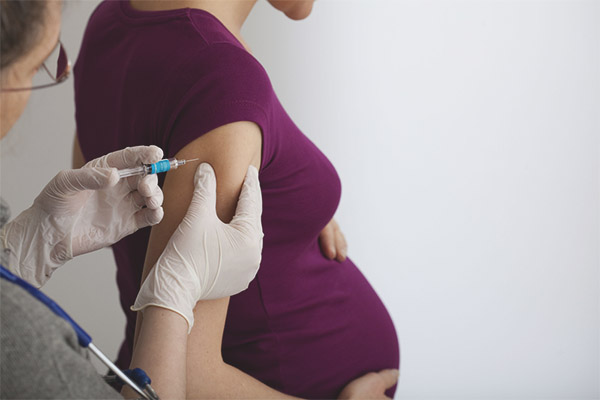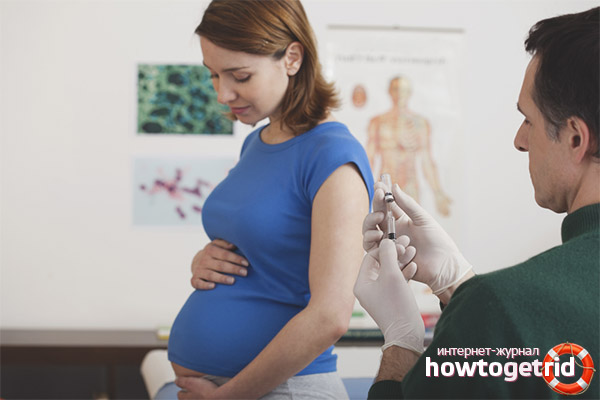The content of the article
The question of the safety of vaccinations for many is relevant in general, and in pregnancy - in particular. This is not by chance, since the future mom makes a responsible decision that can have an impact on her as well as on the unborn child. So Mummy guesses that she will receive after vaccination - heightened and stronger immunity, or undesirable health consequences.
Perhaps the role of the referee here should be a doctor. Possessing sufficient knowledge in the field of medicine, he will be able to determine for certain that there is a real threat of a specific woman becoming infected with an infectious disease and will decide on the need for vaccinations or rejection of them.
Safe vaccination
The question is often put bluntly because some women do consider vaccines to be inherently dangerous, and do not exclude the possibility of causing harm to themselves and the body of their unborn child.But, if we approach this issue more thoroughly, then involuntarily we have to incline to the idea that such a judgment is most likely invented in its essence. For the most part, they are only theoretical assumptions, not supported by any actual arguments.
Another point is the insufficient assessment of the prospects for contracting an infectious disease. Do not even doubt the need for vaccinations in the following cases:
- If the opportunity to get any infectious disease is very likely to be present (for example, if a woman works in a store or bank where there are always a lot of people).
- A potential infectious disease threatens the health of the fetus or the woman herself.
- Vaccination is associated with minimal risk or it is completely absent.
It is from these positions that the question of the feasibility of vaccinations during pregnancy on the part of doctors is considered. They even strongly recommend vaccination if a pregnant woman is in potential danger. The future mom needs to listen not to the advice of her friends and those “competent” in all matters, but to the recommendations of the doctors.It is necessary to conduct a serious analysis and decide what is more important, the health of the unborn child or unreasonable fears about the possible consequences.
It is necessary not to fall into ambitions, but to take this procedure calmly. If you follow the medical advice, then the baby inside the womb will develop normally, and nothing will threaten him. Another argument in favor of the need to discard all fears is that all vaccinations are carried out in strict accordance with established rules. They are designed to minimize all possible negative consequences.
Humanity in its lifetime is familiar with a large number of epidemics, during which just a huge number of people lost their lives. Vaccines have been developed to combat this phenomenon. They are represented by medical preparations that contain live or weakened (inactivated) microbes. The way in which they are introduced into the body, called vaccination, easier, vaccination. As a result, the body produces immunity in accordance with the type of injected vaccine.
Vaccine Administration Methods
An instruction has been developed for any drug, in accordance with which the vaccine should be introduced into the body. The drug can fall into the body in the following ways:
- Intramuscular administration. In this way, for example, a vaccine against influenza or DTP, which protects against diphtheria, whooping cough, tetanus (combination vaccine), is introduced.
- Subcutaneous administration. Injectable vaccine injected into the deltoid muscle or the region of the forearm. This is how the BCG vaccine is administered against tuberculosis.
- Drip through the nose (intranasal route of administration). Similarly, the vaccine against measles and rubella is ingested.
- Through the mouth. The drug drops on the tongue. So vaccinated against polio.
Types of vaccine
On this basis, immunobiological preparations can be divided into 4 groups:
- Live vaccines.
- Inactivated vaccines.
- Anatoxin.
- Molecular (biosynthetic) drug.
Depending on the method of preparation, the drugs are released in the following forms:
- corpuscular type - such vaccines contain a whole pathogen in their composition;
- component type - they contain only antigen;
- recombinant type - they are obtained by the method of introducing antigen into the cell of another microorganism;
Also, vaccines are monovalent, intended for only one type of pathogen and polyvalent, which are designed to protect against several types of pathogen at the same time.
Key vaccine recommendations
Regardless of the stage at which a woman is pregnant, the doctor is obliged to tell her about certain rules that should be strictly followed during vaccination. This will help the future mom to make the right decision about the need for vaccination behavior. But no one will force a woman to do this. She may refuse vaccinations. This possibility is fixed at the legislative level.
- During pregnancy it is prohibited to vaccinate a woman with live vaccines. These drugs include, for example, a vaccine against tuberculosis. It is believed that there is a certain risk of transmitting a live, even if weakened pathogen, to the fetus. But this is only at the level of opinion. There is no objective evidence on this subject.Such cases are not known in practice.
- Vaccination during the first trimester of pregnancy is not allowed. This is due to the fact that it is at this time that the birth and formation of all vital systems of the body occurs. No one is aware of the extent of the possible influence of the vaccine introduced on this process. Can not give an answer until this question and medical professionals. Even if such a danger exists only in theoretical terms, it is better not to risk and be guaranteed to insure against this potential danger.
- It so happens that a woman was vaccinated with one or another drug, but did not know about pregnancy, what is called, neither sleep nor spirit. In this case, it should be warned about the possible consequences of this error. But no one will offer to interrupt her pregnancy. After all, we are talking only about the possible consequences that may not occur.
- Sometimes, at 28 weeks, a woman may be asked to inject immunoglobulin (according to epidemic indications). But she may not agree to that. Pregnant women may refuse immunization in accordance with the law. No one will do it by force.She will be given immunoglobulin only if she herself agrees to it.
- If forecasts of epidemiologists speak in favor of the approaching epidemic, then vaccination against the approaching epidemic disease is carried out without fail.
If the vaccination is performed according to all the rules, the procedure does not pose any danger. It is safe to say that the consequences will be absent, both for the future mother and for her baby. Occasional coincidences occur when miscarriages are observed after vaccination. This naturally gave rise to a lot of rumors. Do not listen to this frank nonsense and go on about the distributors of rumors. Vaccination, in principle, can not lead to miscarriage. All this is nothing more than an annoying coincidence. A woman is advised to listen only to the advice of doctors. Only they, as professionals, are able to give competent advice and useful recommendations.
Vaccine List
In our country, any vaccination is carried out in accordance with the national immunization schedule and according to epidemic indications, when there is a threat of infection by a particular woman. During pregnancy, a woman can be given the following vaccinations:
- Rabies.Vaccination is carried out unconditionally, if there is a threat to get it. Rabies is a serious, dangerous disease, the mortality of which reaches 100%. Vaccination is the only way to protect against it. Of course, it is carried out if there are unconditional indications, but these are already epidemiological subtleties.
- Vaccinating against hepatitis A is not recommended in the first trimester. This is due to the fact that there is insufficient evidence about the degree of safety of the vaccine for the mother and fetus.
- The administration of hepatitis B vaccine is not at risk.
- It is highly desirable to vaccinate against the flu, since the complications of this disease are very dangerous for both the mother and her unborn child.
- Yellow fever. It is not necessary to introduce a vaccine due to the lack of data on the safety of this drug.
- Meningitis. Vaccine administration is effective with minimal risk.
- Pneumococcus. This vaccination is indicated only to women who are at high risk of infection.
- Dbs. It helps protect women from diphtheria and tetanus and is the only drugwho are required to vaccinate women in the absence of previous previous vaccination. It is held during the II trimester.
- Typhus, plague, cholera, encephalitis. Vaccinating with these drugs is not recommended due to the lack of information about the safety of vaccines for the unborn child.
The future mother should always first of all think about the health of her child. Therefore, when deciding on vaccination, she should not rely on the rumors and fantasies of all-knowing friends, but on the recommendations of doctors.
Video: Can pregnant women be vaccinated?












To send